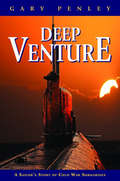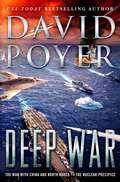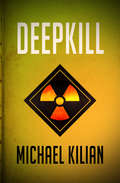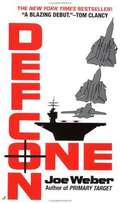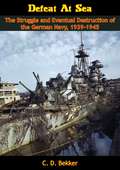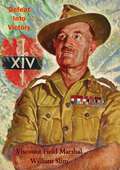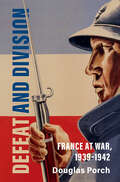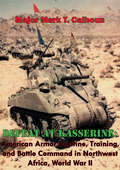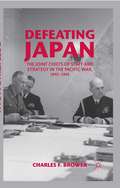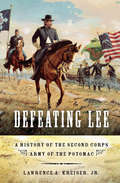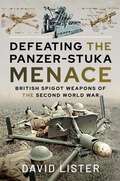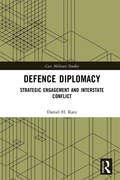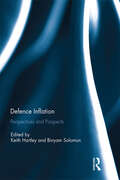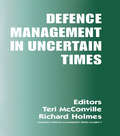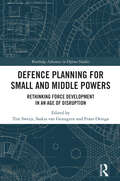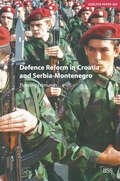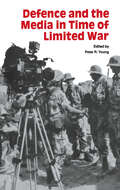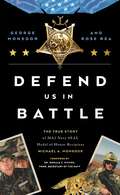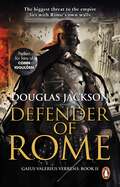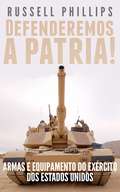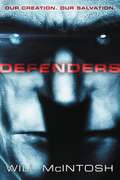- Table View
- List View
Deep Venture: A Sailor's Story of Cold War Submarines
by Gary PenleyA U.S. Navy submariner’s account of his adventurous life in service beneath the waves.Beginning on a cattle ranch in Colorado, this memoir follows a young sailor on his voyage around the world. After enlisting in the U.S. Navy in 1960 and completing the Nuclear Power School program, Gary Penley embarks on a series of adventures-often at risk of his life-while serving on a submarine as a power plant operator.During his seven years with the navy, Penley and his shipmates encounter several frightening situations. While on submerged patrol in the Mediterranean Sea, his submarine, the USS Hamilton, strikes a heavy object, which tears a large hole in the ballast tank and threatens to sink the submarine. Later, they ride out a ferocious storm in the Arctic Circle that nearly submerges the vessel. Another harrowing experience occurs when the sailors, while on a top-secret mission in the Mediterranean during the Six-Day War, are attacked by unknown enemy ships and barely escape unscathed.Throughout his expeditions, Penley stops in such countries as Spain, Scotland, Italy, and Japan. In this captivating memoir, he recounts the coping skills necessary to live in a confined space for extended patrols while facing constant danger—often resulting in hilarious scenarios that only wild submarine sailors could conjure. He also provides a detailed description of the submarine and explains how the machines operate. Written in a candid tone, this memoir carries the reader along for the epic ride.Praise for Deep Venture“Penley uses his naval experience and considerable talent as a storyteller to write a humorous and totally engaging account of life beneath the sea. Against a backdrop of Cold War nuclear deterrence, and the ever-present personal danger faced by submariners, he takes us down the hatch into the claustrophobic confines of his submarine and life among an odd collection of sailors willing to endure the hardship of being submerged and incommunicado for months at a time. . . . A unique and highly entertaining story.” —Michael Archer, author of A Patch of Ground: Khe Sanh Remembered“Clear and lucid writing immediately grips the reader as Penley explores the tension, fear, humor, and adventure of navy and submarine life, enriched with a realism and accuracy that is often missing from such accounts. This story deserves a place on the bookshelf of anyone who reads and admires true stories of adventure at sea.” —James Ennes, author of Assault on the Liberty
Deep War: The War with China--The Nuclear Precipice (Dan Lenson Novels #18)
by David PoyerThe war against China turns dire, as the United States struggles to survive in this gripping thriller featuring Navy commander Dan LensonAfter the United States suffers a devastating nuclear attack, and facing food shortages, power outages, cyber and AI assaults, and a wrecked economy, Admiral Dan Lenson leads an allied force assigned to turn the tide of war in the Pacific, using precisely targeted missiles and high-tech weapons systems. But as the campaign begins, the entire Allied military and defense network is compromised—even controlled—by Jade Emperor, a powerful Chinese artificial intelligence system that seems to anticipate and counter every move. While Dan strives to salvage the battle plan, his wife Blair helps coordinate strategy in Washington, DC, Marine sergeant Hector Ramos fights in an invasion of Taiwan, and Navy SEAL master chief Teddy Oberg begins a desperate journey into central China on a mission that may be the only way to save the United States from destruction and defeat.Thrilling, filled with near-future technology, and deeply grounded in the human cost of war, David Poyer's Deep War is a brilliant novel by an acknowledged master of military fiction.
Deepkill
by Michael KilianAfter a botched terrorist plot, a coast guard agent uncovers a terrifying threat against America The plan is simple. The moment the Homeland Security adviser reaches the middle of the Chesapeake Bay Bridge, a team of suicide bombers will rush his car, killing him and destroying the bridge. But as the plot’s mastermind watches from afar, he sees only 2 small explosions. The bridge has survived; the plan has failed. He will have to find another way to bring terror to the United States—and he’s about to get a fearsome opportunity. Investigating the attack, coast guard agent Erik Westman meets a dying air force pilot who claims to have dumped a nuclear bomb off the coast of Delaware in 1967. It’s still there under 30 feet of water, waiting to be used by anyone mad enough to detonate it. If Westman can’t reach the weapon before the terrorists, the nation’s capitol will burn.
Defcon One (Steve Wickham #1)
by Joe WeberIn this explosive bestseller by the author of Primary Target, the U. S. is poised on the brink of Armageddon. Glasnost has failed. Russia is economically desperate, and has launched the "first strike" in what may become World War III. Only one man knows the extent of the impending horror--a CIA operative trapped in the Kremlin. . .
Defeat At Sea: The Struggle and Eventual Destruction of the German Navy, 1939-1945
by C. D. BekkerThis is the story of the German Navy during 1939-1945.Inadequately prepared for the Second World War, the navy led a bitter struggle on all seas, and in the end was subjected to an overwhelming defeat. More than 120,000 lives were lost, including many individuals whose firsthand accounts make up this gripping and detailed documentary report; they are indispensable if the spirit of that era and the resulting events, as well as the willingness to take action and the courage to sacrifice these men, are to be fully understood…Richly illustrated throughout, former WWII German naval officer Hans Dieter Berenbrok first published this book in German in 1953, under the pseudonym Cajus Bekker and the title Kampf und Untergang der Kriegsmarine. Ein Dokumentarbericht in Wort und Bild. It draws on a vast collection of military records, private archives, and countless personal interviews. It was subsequently published in English in 1955.
Defeat Into Victory
by Viscount Field Marshal William SlimField Marshal William Slim stands alongside Montgomery as the outstanding British field commander of World War II. Defeat Into Victory is his classic account of the Burma campaign: a story of retreat, attrition and final hard-fought victory over the Japanese. Told by a commander always at the centre of events, this is a narrative which captures both the high drama and the harsh reality of war.-Print ed.
Defeat and Division: France at War, 1939–1942 (Armies of the Second World War)
by Douglas PorchDefeat and Division launches a definitive new account of France in the Second World War. In this first volume, Douglas Porch dissects France's 1940 collapse, the dynamics of occupation, and the rise of Charles de Gaulle's Free France crusade, culminating in the November 1942 Allied invasion of French North Africa. He captures the full sweep of France's wartime experience in Europe, Africa, and beyond, from soldiers and POWs to civilians-in-arms, colonial subjects, and foreign refugees. He recounts France's struggles to reconstruct military power within the context of a global conflict, with its armed forces shattered into warring factions and the country under Axis occupation. Disagreements over the causes of the 1940 debacle and the subsequent requirement for the armistice mirrored long-standing fractures in politics, society, and the French military itself, as efforts to reconstitute French military power crumbled into Vichy collaboration, De Gaulle's exile resistance, Alsace-Moselle occupation struggles, and a scuffle for imperial supremacy.
Defeat at Kasserine: American Armor Doctrine, Training, and Battle Command in Northwest Africa, World War II
by Major Mark T. CalhounThe 1st Armored Division was the first American armored unit to enter combat against German panzer divisions in World War II. A product of the contentious mechanization process between the First and Second World Wars, the division soon found itself to be outmatched by its German foe. Following a relatively easy victory against the Vichy French after the amphibious landings of Operation Torch, the division lost a series of battles to the Germans, culminating in a decisive defeat at Kasserine Pass. Doctrine (both institutional and equipment), training, and battle command all proved to be problematic for the division. The central question is: Did the 1st Armored Division lose the battle of Kasserine Pass because of deficiencies in American armor doctrine, training, or battle command? An analysis of the Tunisian campaign focusing on these three areas demonstrates that faulty training and inept battle command were partially responsible for the division's defeat; however, the primary reason the 1st Armored Division lost the battle of Kasserine Pass was that it operated in accordance with flawed institutional doctrine and utilized inferior equipment.
Defeat in the West (Sven Hassel War Classics)
by Milton Shulman Maj.-Gen. Sir Ian JacobTHE STORY OF THE COLLAPSE OF THE GERMAN ARMIES IN THE WEST AND A STUDY OF THE HISTORY OF WORLD WAR II, AS TOLD FROM THE GERMAN POINT OF VIEWIn 1945, the once mighty Wehrmacht was reduced to a pathetic shadow of its former self as the thousand-year Reich lay in ruins. The war in the West had been lost and its protagonists scattered in prisoner of war camps across Europe.Author Milton Shulman joined the Canadian Army HQ three months before D-Day as a major and was promoted to intelligence officer by war's end. As part of his duties, he made close personal contact with the German Army throughout intelligence operations in France, Belgium, Holland and Germany. While still in uniform, he also interviewed many of the captured German generals in the following months and years, including Gerd von Rundstedt, ‘Sepp’ Dietrich and Kurt Meyer—26 in all. From them, Major Shulman learnt why it was that such a superbly armed body of fighting men suffered such a calamitous defeat.This absorbing book is the result of those interviews. First published in 1947, it was the first account to reveal the truth of what happened in the war: how Hitler and his General Staff planned their campaigns, how the discipline and ignorance of the German military machine served Hitler well and Germany badly—and why victory finally slipped from their hands.“The best and most vivid account of the German collapse”—Hugh Trevor Roper, The Sunday Times
Defeating Japan: The Joint Chiefs of Staff and Strategy in the Pacific War, 1943–1945
by Charles F. BrowerA study of the political and military aspects of the US strategy in the fight against Japan during World War II.
Defeating Jihad: The Winnable War
by Sebastian GorkaSince September 11, 2001, America has been at war. And that's about all anyone can say with certainty about a conflict that has cost 7,000 American lives and almost $2 trillion. As long as the most basic strategic questions--Who is the enemy? Why are we fighting?--remain unanswered, victory is impossible. Yet this war is eminently winnable if we remove our ideological blinders, accurately name our enemy, and draw up a strategy to defeat him. So says Dr. Sebastian Gorka, one of the most experienced and sought-after authorities on counterterrorism. Our enemy is not "terror" or "violent extremism. " Our enemy is the global jihadi movement, a modern totalitarian ideology rooted in the doctrines and martial history of Islam. Taking his cue from the formerly top-secret analyses that shaped the U. S. response to the communist threat, Dr. Gorka has produced a compelling profile of the jihadi movement--its mind and motivation--and a plan to defeat it.
Defeating Lee: A History of the Second Corps, Army of the Potomac
by Lawrence A. Kreiser Jr.&“Kreiser breathes new life into this most important of Union Army units. . . . A remarkably well-written and superbly researched account.&” —David E. Long, author of The Jewel of Liberty: Abraham Lincoln&’s Re-election and the End of Slavery Fair Oaks, the Seven Days, Antietam, Fredericksburg, Gettysburg, Cold Harbor, Petersburg—the list of significant battles fought by the Second Corps, Army of the Potomac, is a long and distinguished one. This absorbing history of the Second Corps follows the unit&’s creation and rise to prominence, the battles that earned it a reputation for hard fighting, and the legacy its veterans sought to maintain in the years after the Civil War. More than an account of battles, Defeating Lee gets to the heart of what motivated these men, why they fought so hard, and how they sustained a spirited defense of cause and country long after the guns had fallen silent. &“[An] excellent contribution to Civil War history shelves.&” —Midwest Book Review &“Lawrence Kreiser tells the Second Corps&’ story with verve and attention to personal as well as bureaucratic details.&” —Civil War Librarian
Defeating the Panzer-Stuka Menace: British Spigot Weapons of the Second World War
by David ListerWeapons of myth and scandal, that is the best way to describe the spigot weapons deployed by the British in the Second World War. Unlike conventional mortars, a spigot mortar does not have a barrel through with the round is fired. Instead, the general concept involves a steel rod – the ‘spigot’ – onto which the bomb is placed before it is fired. This design was, as David Lister reveals, the basis of a number of successful weapons used during the Second World War. The myth of the PIAT man-portable anti-tank weapon is, for example, tied closely to British paratroopers struggling in the ruins of Arnhem with an inadequate design, one inferior to the German equivalent. Similarly, the myth of the Blacker Bombard is of a useless weapon, one of dubious quality, that was dumped on the unsuspecting Home Guard. In reality, neither scenario is the case. Both weapons were devastating creations of war, often superior to any other nation’s counterpart. At sea, the Hedgehog anti-submarine weapon was another powerful spigot weapon. It was undoubtedly capable of sweeping the U-boats from the sea and even winning the Battle of the Atlantic before it had really begun. That it did not is one of the great scandals of the Second World War, one hidden by wartime secrecy until now. In Defeating the Panzer-Stuka Menace the author explores a large number of spigot weapons from the Second World War, many of which were created by the fertile mind of one of Britain’s great weapon inventors, Latham Valentine Stewart Blacker.
Defence Diplomacy: Strategic Engagement and Interstate Conflict (Cass Military Studies)
by Daniel H. KatzThis book analyzes examples of strategic engagement in order to identify the factors which contribute to the success or failure of defence diplomacy in preventing interstate conflict. For more than a century, nations have engaged in defence diplomacy to cultivate mutual understanding and mitigate conflict. A subset of defence diplomacy is strategic engagement, defined as peacetime defence diplomacy between nations that are actual or potential adversaries. This book analyzes three cases of strategic engagement in order to elucidate the factors which contribute to the success or failure of this diplomacy in preventing conflict. It uses an inductive framework to compare strategic engagement in the following cases: Anglo– German defence diplomacy prior to World War I; U.S.–Soviet defence diplomacy during the Cold War; and post-Cold War U.S.–China defence diplomacy. Based upon archival, literature, and personal interview research, the book argues that defence diplomacy can mitigate the risk of interstate conflict between potential adversaries. The lessons learned from this book can be employed to discern the significant elements conducive to achieving a successful outcome of strategic engagement and averting conflict or even war. This book will be of much interest to students of defence studies, diplomacy studies, foreign policy and international relations.
Defence Inflation: Perspectives and Prospects
by Binyam Solomon Keith HartleyDefence inflation is a recurring factor in determining defence spending. It is widely reported in official government publications and in the trade press, but remains relatively neglected by defence and peace economists. In this book, international contributors from Finland, Norway, Sweden, the UK and the USA distinguish between defence inflation and cost escalation, and identify the causes of both. They use specific case studies to address a wide variety of theoretical and empirical issues and key questions, including the following: Does defence inflation affect all countries? What are its effects? Why does it occur? How (if at all) can defence inflation be controlled?While most industry and trade press devote considerable ink and space to the discussion of defence inflation, cost escalation, and their consequential impact on the purchasing dollars of the armed forces, economists have been relatively silent. This book aims to rectify this oversight through a multinational survey and analysis of the topic, while also identifying the opportunities for further theoretical and empirical research in the field. This book was originally published as a special issue of the journal Defence and Peace Economics.
Defence Management in Uncertain Times
by Richard Holmes Teri McConvilleFrom the impact of the attacks on New York and Washington in 2001, to the problems of military uncertainty and the role of women in combat, this collection of essays explores the changing face of militarism from the perspective of defence management experts.
Defence Offsets and the Global Arms Trade: Explaining Cross-National Variations (Routledge Advances in Defence Studies)
by Jonata AnicettiThis book offers the first comprehensive study of defence offsets and its economic, security, political and theoretical implications.Originating in the second half of the 19th century, defence offsets - additional economic, industrial and technological benefits to states for buying foreign weapons - have since been a key feature of the global arms trade and defence industry. And yet, offsets are an under-researched and under-theorised phenomenon. This book fills this gap in the literature by offering the first general theory of defence offsets, as well as the first systematic analysis of the offset phenomenon. By building on the insights of scholars of defence economics and drawing from the International Relations liberal paradigm, as well as reviving and adapting Robert Putnam’s two-level game framework, the book proposes a liberal-rationalist theory of defence offsets. It then proves the worth of such a theory through Qualitative Comparative Analysis (QCA) of fifty-four fighter aircraft transfers from 1992 to 2021 inclusive, and three in-depth case studies addressing offsets negotiated and agreed to as part of fighter aircraft competitions in Brazil, India, and South Korea.This book will be of interest to students of defence studies, defence economics, security studies and international relations.
Defence Planning for Small and Middle Powers: Rethinking Force Development in an Age of Disruption (Routledge Advances in Defence Studies)
by Frans Osinga Saskia Van Genugten Tim SweijsThis book examines the processes, practices and principles of defence planning in small and middle powers.Small and middle powers are recalibrating their force postures in this age of disruption. They are adapting their defence planning and military innovation processes to protect the security of their nations. The purpose of this book is to explore defence planning and military innovation in 11 contemporary case studies of small and middle powers in North America, Europe, the Middle East, Asia and Oceania. Employing a structured focused comparison framework, it traces patterns in the choices of small and middle powers across the following themes: (1) alliances, dependencies and national ambitions; (2) approaches, processes, methods and techniques; and (3) military innovation strategies and outcomes. Breaking new theoretical ground, it offers a three-pronged typology distinguishing between the strategic defence planner, the transactional defence planners and the complacent defence planner. The book offers a rich array of insights into cases that fall across different geographies, strategic cultures and governance systems. These insights can help guide discussions on how to structure decision-making structures, arrive at ambition levels, formulate priorities, select partners and design defence planning and military innovation processes.This book will be of much interest to students of defence studies, security studies, public policy and international relations, as well as to professionals in defence planning.
Defence Reform in Croatia and Serbia--Montenegro (Adelphi series)
by Timothy EdmundsThis book examines defence reform in Croatia and Serbia-Montenegro since 2000, focussing particularly on the institution and consolidation of democratic and civilian control of the armed forces, the reform of conflict-era forces structures, and the influence of the West including defence assistance and political conditionality.
Defence and the Media in Time of Limited War
by Peter R YoungFirst Published in 2004. Routledge is an imprint of Taylor & Francis, an informa company.
Defend Us in Battle: The True Story of MA2 Navy SEAL Medal of Honor Recipient Michael A. Monsoor
by George MonsoorOn September 29, 2006, Michael Monsoor and two SEAL snipers watched vigilantly for enemy activity from their rooftop post in Ar Ramadi, Iraq. When a grenade thrown from insurgents bounced off Michael's chest, he could have escaped. Instead, he threw himself onto the live grenade, shielding his fellow soldiers from the immediate explosion. Michael died thirty minutes later, having made the ultimate sacrifice.As George Monsoor (Michael's father) and Rose Rea show us in Defend Us in Battle, Michael had prepared for this selfless act all his life--a life that inspires us to have a similar generosity of heart. This fast-paced, compelling biographytells the true story of a quiet boy from California who achieved his dream of becoming a Navy SEAL and saved numerous lives throughout his deploymentrecounts how Michael's childhood of asthma and being bullied made him a staunch defender of justice and passionate about never quittingdraws on interviews, military documents, and eyewitness accounts to detail Michael&’s remarkable military career and devotion to God and othersis an ideal gift for readers of military biographies such as Unbroken, as well as for anyone eager to remember that this world still has heroesIn addition to the Medal of Honor, Michael received a Silver Star, a Bronze Star Medal, and the Purple Heart for his years serving his country. But his greatest legacy is in the hearts of those he inspired to live, and even die, for the sake of brotherly love.
Defender of Rome: (Gaius Valerius Verrens 2): A heart-stopping and gripping novel of Roman adventure (Gaius Valerius Verrens #2)
by Douglas JacksonThis riveting and action-packed historical thriller from bestselling author Douglas Jackson is real edge of your seat stuff! Perfect for fans of Simon Scarrow and Ben Kane.Readers are loving Gaius Valerius Verrens! "Absolutely incredible." - 5 STARS."Gripping, violent and captivating." - 5 STARS."The best Roman historical series I've yet read. Just pips Ben Kane and Conn Iggulden." - 5 STARS **************************************************************Gaius Valerius Verrens returns to Rome from the successful campaign against Boudicca in Britain. But he is not the man he once was - scarred both physically and emotionally by the battles he has fought. And neither is Rome the same city as the one he left.The Emperor Nero grows increasingly paranoid. There is talk of a new threat, one found within the walls of Rome itself. A new religious sect, the followers of Christus, deny Nero's divinity and are rumoured to be spreading sedition.Nero calls on Valerius to seek out this rebel sect and to capture their leader. Failure would be to forfeit his life, and the lives of twenty thousand Judaeans living in Rome. But as Valerius begins his search, a quest which will take him to the edge of the empire, he will discover that success may cost him nearly as much as failure.Gaius Valerius Verrens's adventures continue in Avenger of Rome.
Defender of the Underdog: Pelham Glassford and the Bonus Army
by Harvey FergusonIn 1932, the worst year of the Great Depression, more than twenty thousand mostly homeless World War I veterans trekked to the nation&’s capital to petition Congress to grant them early payment of a promised bonus. The Hoover Administration and the local government urged Washington, DC, police chief Pelham Glassford to forcefully drive this &“bonus army&” out of the city. Instead, he defied both governments for months and found food and shelter for the veterans until Congress voted on their request.Glassford&’s efforts to persuade federal and local officials to deal sympathetically with the protesters were ultimately in vain, but his proposed solutions, though disregarded by his supervisors, demonstrate that compassion and empathy could be more effective ways of dealing with radical protests than violent suppression.
Defenderemos a Pátria!: Armas e Equipamento do Exército dos Estados Unidos
by Russel PhillipsO exército dos Estados Unidos é a mais bem equipada força em toda a história militar, desde a simples baioneta até às multimilionárias maravilhas tecnológicas como o tanque Abrams M1 e o helicóptero Apache Longbow. "Defenderemos a Pátria!" resume as mais importantes armas e equipamento usado presentemente pelo Exército. Todos os factos, números e imagens neste ebook vêm directamente de fontes sobre o Exército, acessíveis ao público, editadas e registadas de maneira a formar um manual de referência sucinto, fácil de usar mas altamente informativo.
Defenders
by Will McintoshA new epic of alien invasion and human resistance by Hugo Award-winning author Will McIntosh. Our Darkest Hour.Our Only Hope.The invaders came to claim earth as their own, overwhelming us with superior weapons and the ability to read our minds like open books. Our only chance for survival was to engineer a new race of perfect soldiers to combat them. Seventeen feet tall, knowing and loving nothing but war, their minds closed to the aliens. But these saviors could never be our servants. And what is done cannot be undone.
